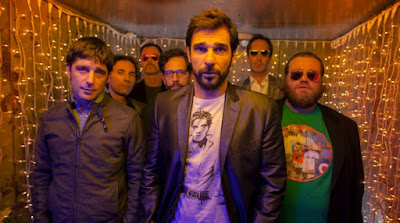A Smetto Quando Voglio trilogy is currently in the works and shooting for the second installment will get started in Rome this March. The original cast- Edoardo Leo, Valeria Solarino, Paolo Calabresi, Stefano Fresi, Libero De Rienzo, Pietro Sermonti, Lorenzo Lavia and Valerio Aprea -is reportedly returning and some new faces may be joining them.
I credit director Sydney Sibilia and his amazing cast with making the funniest, most clever film I have ever seen. The story recounts a group of professors and scientists who lost their jobs and were forced to find work washing dishes and pumping gas just to make ends meet. Completely fed up, Pietro (Edoardo Leo) comes up with a plan to develop a legal drug that he could sell to club kids looking for a quick high. He enlists the help of his fellow down-on-their-luck geniuses, which include an economist, chemist and anthropologist. The group goes on to make money beyond their wildest dreams. But with the money comes a whole new host of problems. What ensues is a hilarious adventure watching these self-proclaimed ‘nerds’ take on ‘tough-guy’ roles and try to assimilate into the underground world of drugs and corruption. The combination of excellent writing, top-notch acting and a director with a clear vision, make for a contemporary classic comedy that was voted my Open Roads 2014 must-see film.
I cannot wait to see what Sibilia has in store for the next two installments! We will keep you updated as soon as information becomes available.
Update posted by Cineuropa
5 April 2016
“My generation grew up watching film sagas, and I took great delight in imagining what would happen if you used Italian-style comedy, in its most classic form, to make a trilogy”. These were the words of Sydney Sibilia, who has decided to transform the entertaining adventures of the unemployed university researchers of his highly successful debut film, into a trilogy. Filming for the second and third chapters of this new ‘saga comedy’ began this week in Rome; the two films will be filmed together over 16 weeks in Rome, Lagos and Bangkok.
Written by Sydney Sibilia with Francesca Manieri and Luigi Di Capua, I Can Quit Whenever I Want – The Trilogy is a production between Groenlandia and Fandango with Rai Cinema produced by Domenico Procacci and Matteo Rovere. The photography is being handled by Vladan Radovic, the editing by Gianni Vezzosi, the sets by Alessandro Vannucci, the costumes by Patrizia Mazzon, and the sound by Angelo Bonanni.
The first of the two films will hit theatres on 2 February 2017 under the distribution of 01 Distribution.


Comments
Post a Comment